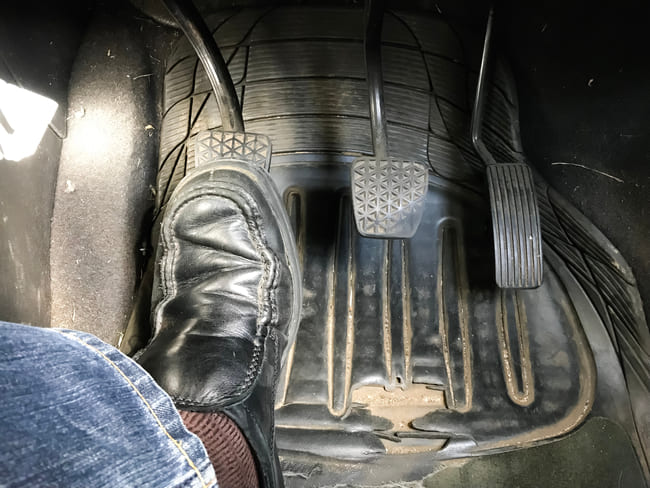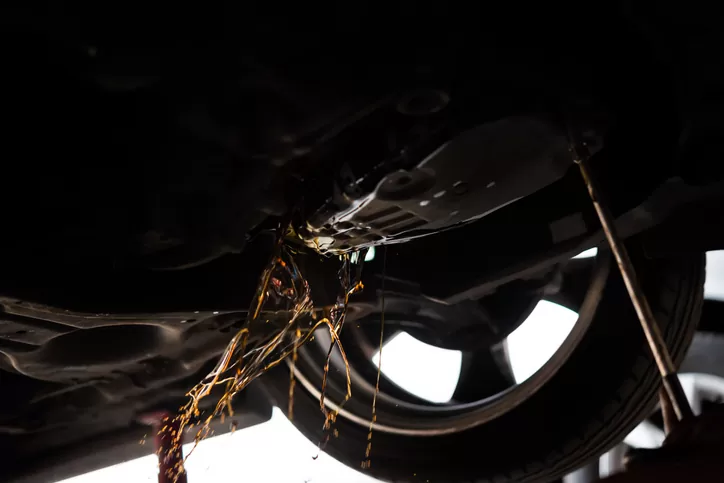Have you ever wondered what transmission fluid check is and why it’s so important to your vehicle? Transmission fluid is essential for keeping your car running smoothly. It not only lubricates the gears but also helps to cool the transmission system and prevent overheating. If the fluid level gets low, you may notice some unusual issues with your vehicle. These could include low ATF symptoms like delayed shifting, vibrations, or difficulty engaging gears.
Low Transmission Fluid Symptoms for Manual & Automatic
Here are the Important Signs of Low Transmission Fluid and How to Fix It:
1. Shifting Difficulties

If your car has shifting difficulties, it could be a symptom of low transmission fluid. Transmission fluid helps lubricate the moving parts of your transmission. It also helps keep the transmission cool. If the fluid level is low, then the transmission will have to work harder, which can cause shifting problems. If you suspect this issue, do not just continue driving on low transmission fluid. You should have your vehicle checked by a qualified mechanic. They will be able to solve this issue and make any necessary repairs.
2. Vibrations & Lurching

If you’re feeling vibrations or lurching while driving, it could be one of the low gearbox oil symptoms in automatic cars. Transmission fluid does a lot of heavy lifting—it cools and lubricates the gears. When there’s not enough fluid, the gears can overheat and struggle to work properly, causing those jerky movements you’re noticing.
In some cases, it might even lead to your engine stalling or your car losing power altogether. Don’t ignore these signs! Get your automatic transmission fluid check by a professional as soon as possible to avoid bigger problems down the road.
3. Stuck Clutch Pedal

Trouble shifting gears can often point to low transmission fluid. One specific symptom is a stuck clutch pedal, which may feel unusually stiff or fail to return to its original position. This happens because insufficient fluid prevents the clutch from fully engaging, disrupting smooth gear changes.
If you notice this issue, don’t ignore it. Low transmission fluid can lead to serious damage to your transmission, resulting in costly repairs. Have your vehicle inspected by a trusted mechanic to address the problem promptly and protect your car from further harm.
4. Delayed Shifting
A common symptom of low transmission fluid is slow engagement of gears. For instance, when shifting from Park to Drive, you might notice a delay before the car starts moving. This can happen for various reasons, but one major cause is low transmission fluid. When fluid levels drop, the gears may struggle to engage, causing a noticeable lag. If this issue arises, it’s crucial to have the vehicle inspected by a professional mechanic as soon as possible. Ignoring low transmission fluid can lead to significant damage to the transmission, so addressing it early can help avoid costly repairs down the road.
If you have problems with the car shaking especially while accelerating then check out our blog to troubleshoot and fix the issue.
5. Fluid Leak

If your car is leaking fluid, paying attention to the color and location of the leak can provide valuable clues. Transmission fluid is typically red, so if you notice a red fluid pooling under your car, it’s a strong sign that your transmission fluid level is low. These leaks are often found near the front of the engine, under the hood.
Low transmission fluid caused by leaks can lead to serious issues, such as difficulty shifting gears or even stalling. If you spot a red fluid leak, it’s essential to address it promptly by checking your fluid levels and consulting a mechanic to prevent potential damage to your vehicle’s transmission system.
6. Slipping Between Gears
When you depress the clutch pedal, you expect a smooth transition from one gear to the next. If your car slips out of gear, it’s a sign that the clutches are not engaging properly. This can be caused by a number of factors, but low fluid level is one of the most common. As the fluid level drops, it becomes harder for the clutches to engage. As a result, they may slip or may not engage at all. If you notice that your car is slipping, check the fluid level and add more if necessary. This simple step can help to prolong the life of your transmission and avoid costly repairs down the road.
7. Overheating

While overheating isn’t usually linked to low transmission fluid in newer automatic cars, it’s a common issue in older models. Low transmission fluid can lead to overheating because the fluid plays a crucial role in cooling and lubricating the transmission system. Without enough fluid, the transmission has to work harder, generating excess heat.
If your car starts to overheat, it’s vital to have it inspected by a mechanic to pinpoint the root cause. Whether it’s due to low transmission fluid or another issue, addressing it early can prevent further damage and keep your car running smoothly.
Final thoughts,
Transmission fluid is necessary for keeping your car running smoothly and plays a vital role in everything from engine performance to the lifespan of your vehicle. If you notice any sign of bad transmission fluid, such as unusual noises, delayed gear shifts, or a burning smell, it’s crucial to address the issue immediately.
Don’t wait until these symptoms worsen. Schedule a transmission fluid check-up today with a professional mechanic to ensure your vehicle stays in peak condition and avoid costly repairs in the future.
FAQs
1. How far can I drive on low transmission fluid?
Yes, you can drive a car for around 10 to 15 miles on low transmission fluid. However, this is extremely dangerous as it can cause permanent damage to the vehicle.
2. What happens if you drive on low transmission fluid?
Driving a vehicle on low transmission fluid can cause hazards, leading to extreme damage to the vehicle engine, transmission and other important components that help a vehicle run smoothly.
3. Will low transmission fluid cause a car not to start?
If you continue running a car on low transmission fluid, it will eventually cause the car not to start.
4. Can I check if the transmission fluid is low without a dipstick?
Yes, you can check the transmission fluid level without a dipstick.
5. How long should transmission fluid last?
Depending on how your vehicle is used, you need to change the transmission fluid from time to time. For heavy-usage vehicles, the transmission fluid lasts for a shorter period.
6.How often should I check my transmission fluid?
Every 30,000–60,000 miles, but refer to your car manual for exact intervals.
7.Can I drive with low transmission fluid?
It’s risky! Driving with low fluid can cause severe damage to the transmission system.
